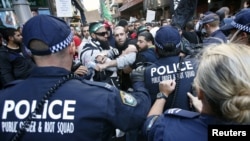SYDNEY —
Australians are still discussing the fallout from a violent riot in September, when a protest against an anti-Islam film involving a few hundred people ended amid clashes with police in downtown Sydney. Muslim groups in Australia have complained that some news coverage of the disturbances was inflammatory.
The protest began in Sydney on September 15, as part of a global protest against an anti-Islam film Innocence of Muslims that was produced in the United States.
Clashes between Australian police and Muslim protesters began when the rally reached the U.S. Consulate in Sydney. Several protesters were arrested. The rioters were widely condemned by the Muslim community, which claimed the event had been hijacked by a violent minority.
Media vs. Muslims
However, some newspaper editorials accused sections of Australia’s Islamic community of trying to wreck multiculturalism, while others suggested Muslims were too tolerant of radical anti-Western preachers and had allowed dissent to boil over.
Analysts said the unrest damaged relations between mainstream Australian society and the Muslim minority.
Thursday, a panel discussion at the New South Wales State Parliament examined how to repair those relations and how the news media's covered the aftermath of the riots.
Conference organizer Kuranda Seyit, the founder of the Forum on Australia's Islamic Relations, said news coverage of Muslims can often be too superficial or inaccurate.
“Sometimes it can be skewed to be controversial or sensationalist, and unfortunately Muslims bear the brunt of a lot of that type of media coverage, and we saw that with the riots in Sydney," said Seyit. "We saw it with many other issues around the world. We see that Islam generally is seen as aggressive or violent or, you know, behind terrorist acts and things like that. So there is not enough analysis.”
Defending the media
Media executives have insisted their coverage has been fair. In the days after the Sydney riots, many outlets published articles by Islamic scholars. The Sydney Morning Herald said “the overwhelming majority of Muslims in Australia do not believe that a small band of violent youths speak for them. “
Kuranda Seyit said that, although some media companies acted responsibly, others were too quick to tarnish the entire Muslim community.
“It is a bit more frightening and dumbing down of our program content, which is not a good indication for the future," said Seyit. "But, I think it is coming down to, you know, ratings and dollar figures and advertising. Look, there are a lot of areas we can improve on.”
Australia has a diverse Islamic community, drawn from more than 70 countries.
According to the latest figures, Australia is home to more than 475,000 Muslims, who make up about two-and-a-quarter percent of the national population.
The protest began in Sydney on September 15, as part of a global protest against an anti-Islam film Innocence of Muslims that was produced in the United States.
Clashes between Australian police and Muslim protesters began when the rally reached the U.S. Consulate in Sydney. Several protesters were arrested. The rioters were widely condemned by the Muslim community, which claimed the event had been hijacked by a violent minority.
Media vs. Muslims
However, some newspaper editorials accused sections of Australia’s Islamic community of trying to wreck multiculturalism, while others suggested Muslims were too tolerant of radical anti-Western preachers and had allowed dissent to boil over.
Analysts said the unrest damaged relations between mainstream Australian society and the Muslim minority.
Thursday, a panel discussion at the New South Wales State Parliament examined how to repair those relations and how the news media's covered the aftermath of the riots.
Conference organizer Kuranda Seyit, the founder of the Forum on Australia's Islamic Relations, said news coverage of Muslims can often be too superficial or inaccurate.
“Sometimes it can be skewed to be controversial or sensationalist, and unfortunately Muslims bear the brunt of a lot of that type of media coverage, and we saw that with the riots in Sydney," said Seyit. "We saw it with many other issues around the world. We see that Islam generally is seen as aggressive or violent or, you know, behind terrorist acts and things like that. So there is not enough analysis.”
Defending the media
Media executives have insisted their coverage has been fair. In the days after the Sydney riots, many outlets published articles by Islamic scholars. The Sydney Morning Herald said “the overwhelming majority of Muslims in Australia do not believe that a small band of violent youths speak for them. “
Kuranda Seyit said that, although some media companies acted responsibly, others were too quick to tarnish the entire Muslim community.
“It is a bit more frightening and dumbing down of our program content, which is not a good indication for the future," said Seyit. "But, I think it is coming down to, you know, ratings and dollar figures and advertising. Look, there are a lot of areas we can improve on.”
Australia has a diverse Islamic community, drawn from more than 70 countries.
According to the latest figures, Australia is home to more than 475,000 Muslims, who make up about two-and-a-quarter percent of the national population.




